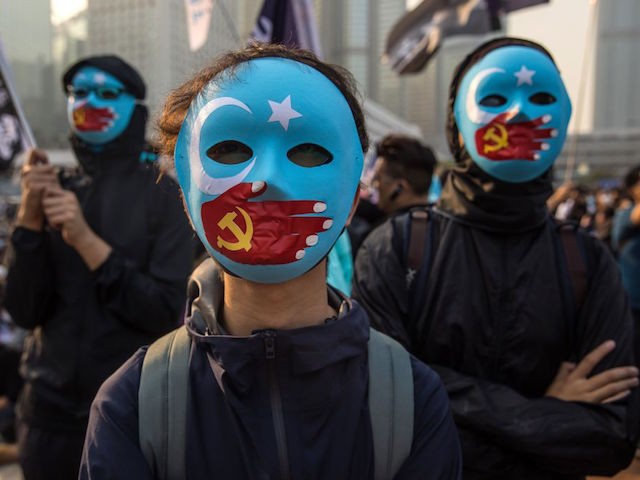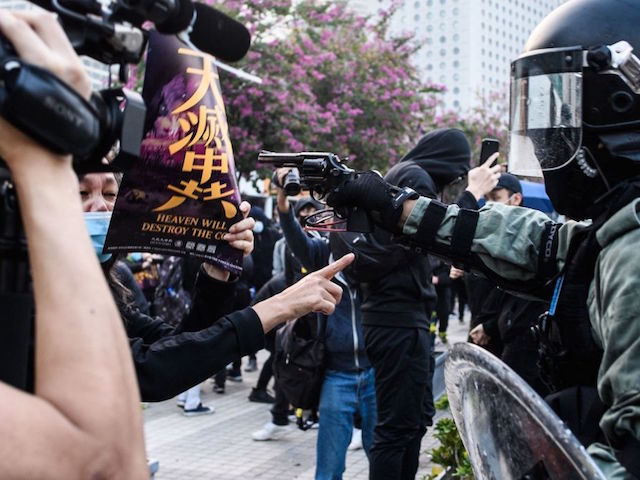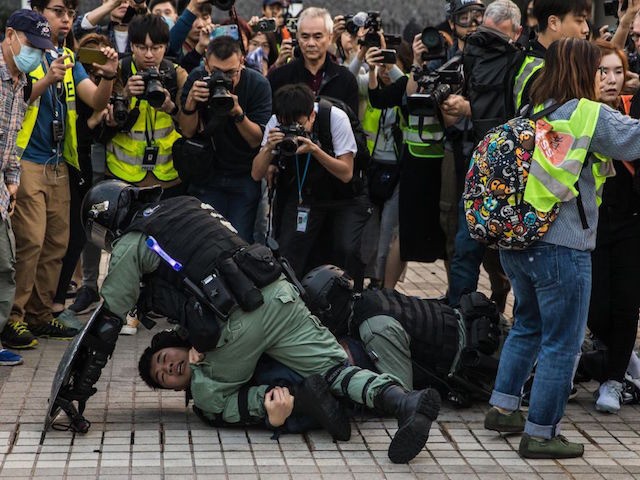Hong Kong police violently repressed a protest attracting an estimated thousand people Sunday against the use of concentration camps to eliminate the ethnic Uyghur minority of western China, beating protesters with batons and threatening to shoot them.
Sunday’s protest differed from the ones occurring often more than twice a week in the capitalist city against China in that the Hong Kong residents were demanding an end to human rights abuses for the Muslim ethnic majorities of Xinjiang, known by its residents as East Turkestan, rather than objecting to China’s abuses within Hong Kong itself.
Since early June, millions of people in Hong Kong have taken to the streets objecting to Beijing’s attempts to impose its draconian communist laws on them. They are currently making four demands of their government: an independent investigation into police brutality, the right to directly elect lawmakers, freedom for political prisoners, and an end to police calling peaceful protests “riots.”
On Sunday, however, they demanded an end to the repression of Uyghurs and other minorities in Xinjiang. The Pentagon estimated this year that China has imprisoned between 1 and 3 million Muslims in over a thousand concentration camps all over the province, where the regime forces them to learn Mandarin and abandon their native Uyghur language, memorize songs worshipping dictator Xi Jinping, and pledge loyalty to the Han Chinese majority. Survivors of the camps say they have witnessed murder, rape, torture, slavery, and evidence of live organ harvesting.

Protesters attend a rally in Hong Kong on December 22, 2019, to show support for the Uyghur minority in China. (DALE DE LA REY/AFP via Getty Images)
Images from the protest Sunday show Hong Kong residents flying the flag of the United Kingdom, which they belonged to until 1997; the flag of East Turkestan; and the black flag of Hong Kong independence. Some angrily waved the flag of the Chinese Communist Party or a flag in which the stars of the Chinese flag are shaped into a swastika, linking China’s human rights atrocities to those of Nazi Germany.

People attend a rally in Hong Kong on December 22, 2019, to show support for the Uyghur minority in China. (ANTHONY WALLACE/AFP via Getty Images)
Hong Kong’s protesters have repeatedly expressed fear that, if their cause does not win, Beijing would use the same repressive tactics it deploys in Xinjiang on them.
“Even in these few months, or a year or two, [the sort of things that] we see in Xinjiang like surveillance, patriotic education, could also happen in Hong Kong,” a protester told the local broadcaster RTHK. “What they’re trying to do is they’re trying to re-educate the population. They’re forcing people to love the country even though you don’t need to force someone to do that, so I’m pretty sure that’s going to happen here as well.”
Speaking to Al Jazeera, another protester similarly argued that China will “do the same” to Hong Kong that it has done to Xinjiang when the 50-year term of “One Country, Two Systems” expires: “In Xinjiang they are doing what they are doing because they have the power to do so. When they take over Hong Kong they will do the same.”
“One Country, Two Systems” is the policy that governs Hong Kong, which bans the city from seeking independence from China but also bans China from imposing communism on it. Protesters assert that China flagrantly violates the “One Country, Two Systems” principle by controlling who runs the local government and imposing laws that curb dissident thought.
Hong Kong riot police break up a solidarity rally for China's Uighurs — with one officer drawing a pistol. Sunday. @AFP pic.twitter.com/vpds0C2zvh
— Satish Cheney (@SatishCheney) December 23, 2019
Police began to use violence against protesters when one of them removed a Chinese flag from outside of City Hall, according to the Hong Kong Free Press (HKFP). Burning, trampling, or in any way insulting the dignity of the Chinese flag is a crime in Hong Kong punishable by up to three years in prison, a relatively recent law that triggered significant protests after passing; a similar law applies to “March of the Volunteers,” the national anthem of China. Police beat protesters with batons, shot rubber bullets at a crowd on a footbridge — the outlet does not specify why — threatened to use tear gas, used pepper spray, and waved a gun in the face of some protesters, though did not use live fire.

A police officer points a pistol during a rally in Hong Kong on December 22, 2019, to show support for the Uyghur minority in China. (ANTHONY WALLACE/AFP via Getty Images)
According to HKFP, “Riot police arrived and subdued several protesters and beat them with batons. Other protesters threw objects including plastic bottles at police, and officers responded with batons and pepper spray.”
Senior police officials defended officers’ crackdown on the protest on Monday.
“Some rioters pushed our officers onto the ground, snatched at his belt … it was a very dangerous and chaotic situation,” Chief Superintendent Kwok Ka-chuen told reporters, according to RTHK. “At this juncture our officer pulled out his service revolver to protect his safety and save his colleagues. Once the situation came under control, he put his revolver back.”
Hong Kong’s police force sent a group of anti-terrorism task force officers to Xinjiang last year, before the protests began, to study police tactics against Uyghurs, exacerbating concern in Hong Kong that they will soon fall victim to the same repression.
The World Uyghur Congress, an international advocacy organization for the rights of the ethnic minority, issued a statement on Twitter thanking the Hong Kong protesters for championing the cause of the Uyghurs.
“Thank you to the people of Hong Kong for their support & solidarity,” the message read. “The Chinese gov’t’s horrific repression is bringing Uyghurs, Hong Kongers, Tibetans & others together in pursuit of basic rights & freedoms.”

COMMENTS
Please let us know if you're having issues with commenting.